Research activities of the Centre in large involve student participation at various motivational grant programmes as well as organisation of informal seminars and workshops. Students are encouraged to participate at international conferences and to get involved in solving research grants. Students and researchers of the Centre were involved in the following activities in 2021:
In November 2021, Debora Lančová and Marek Abramowicz participated in the Nordita Astrophysics Seminars organized every week by Nordita (Nordic Institute for Theoretical Physics) in Stockholm, Sweden. The seminar was held in a hybrid mode (both in person and online via Zoom) and focused on the puffy accretion disk models.

Our Contributions
Talks
In October 2021, Andrea Kotrlová attended the PLATO Mission Conference 2021: Exploring exoplanets in the habitable zone of solar-like stars. PLATO is the M3 mission in ESA’s Cosmic Vision programme and currently under development with a planned launch date in 2026. The primary goal of PLATO (PLAnetary Transits and Oscillations of stars) is to open a new way in exoplanetary science by detecting terrestrial exoplanets and characterizing their bulk properties with an unprecedented accuracy, focusing on Earth-size planets orbiting in the habitable zone of bright Sun-like stars.

The conference aimed at presenting the status of the PLATO mission to the community, both on the satellite development and scientific preparation, and at bringing experts working on observations and theory associated with any of the PLATO science objectives. The main topics of the conference included planetary structure, composition, evolution, and architecture of planetary systems, asteroseismology and stellar characterization, stellar variability, long-period small planets and habitability, light-curve analysis, PLATO in the context of Kepler/K2, TESS, CHEOPS, JWST, Roman Space Telescope, Ariel, and large ground-based observatories and also complementary science topics benefitting from PLATO high-precision photometry. Official group photo can be found on the conference website. Links to recorded sessions and talks, posters, and presentation slides are available here.
In September 2021, Debora Lančová participated at the 9th Microquasar 2021 Workshop. The conference was organized to celebrate the 50 years since the discovery of variable radio emission from X-ray binaries. It was held (in a hybrid mode) in Cagliari, Sardinia, Italy and was the ninth in a series of conferences mainly devoted to microquasars but also covering relativistic jet sources in a broader context.
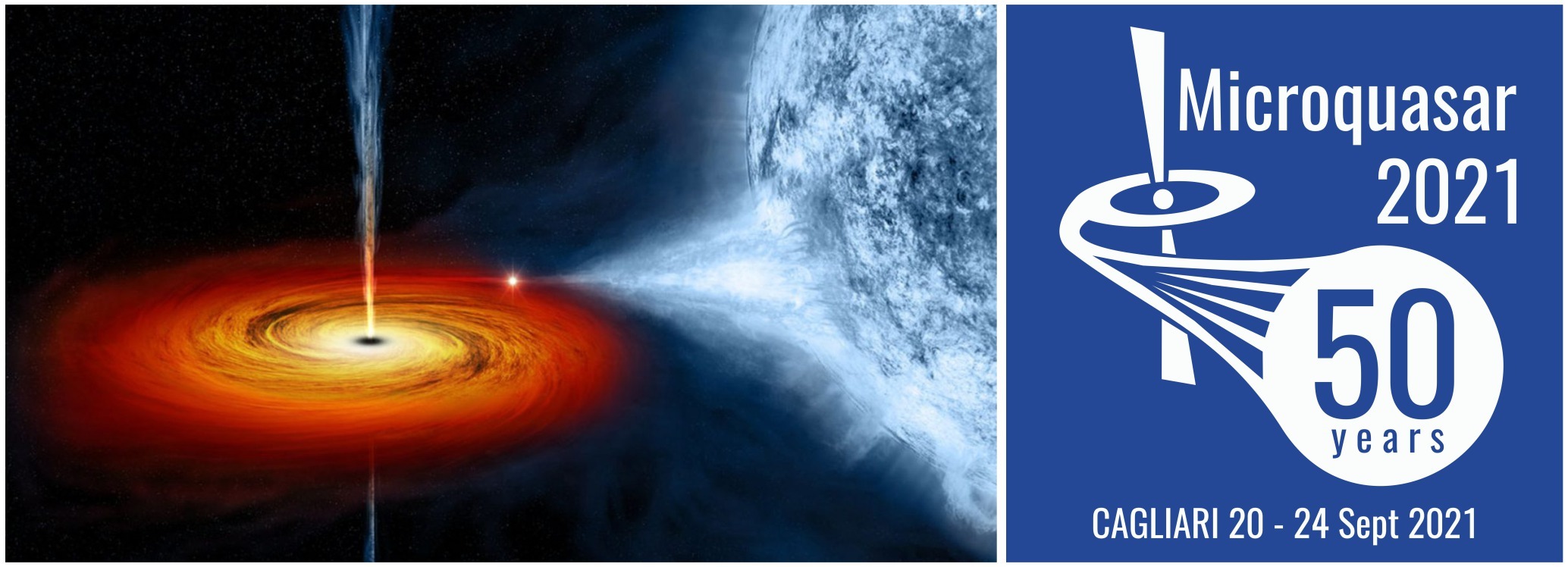
The workshop aimed to present and discuss the latest results related to X-ray binaries, in particular accretion/ejection physics (multi-wavelength observations and theory/simulations), the properties, mechanisms and interplays of the accretion disk, disk winds, jets, accretion/ejection at all scales, and comparison with the various accretions (BH, NS, CV). The formation, evolution and merging of compact objects in binaries were also addressed. In the context of recent missions devoted to transient sources, new facilities were discussed (such as NICER, HXMT, MeerKAT, ASKAP), in addition to new tools and diagnostics based on X-ray timing. The scientific programme was organized in several sessions including invited reviews, contributed talks, posters and time for discussion. Collection of posters and talks presented at the Microquasar 2021 conference is available online through Zenodo.
Our Contributions
Posters
In September 2021, Andrea Kotrlová attended the EANA 2021 Virtual Conference organized in the frame of the 20th anniversary celebrations of the European Astrobiology Network Association (EANA).
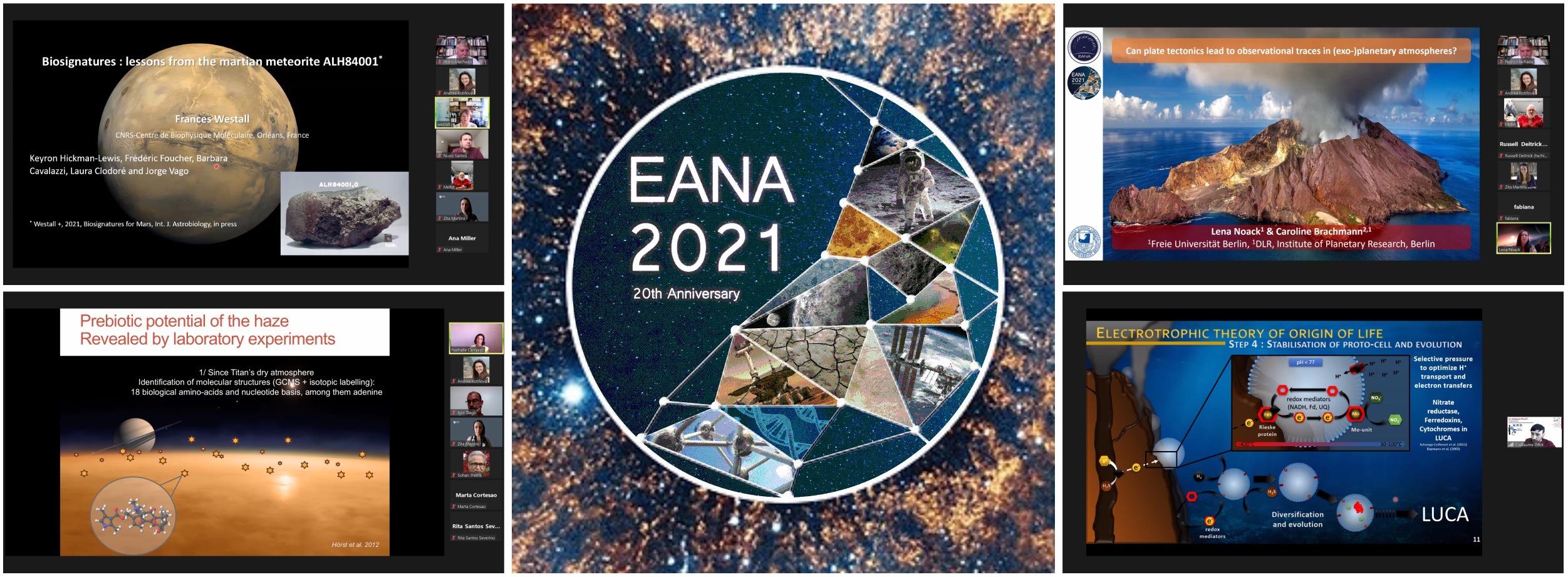
The virtual EANA 2021 meeting connected the international astrobiology community, with an interesting and interactive programme for four half days from September 7th to 10th, 2021. The virtual meeting consisted of invited keynote presentations, several oral presentations, the well-known Space Factor student contest, as well as poster presentations. The conference covered topics related to the origin and evolution of life, early Earth and habitability, exoplanets and exomoons, planetary analog research and extreme conditions on Earth, space biology and extremophiles, biosignatures, outreach and education. The agenda of the conference and official group photo can be found on the conference website.
The series of the annual RAGtime workshops has been organized at the Institute of Physics in Opava by the Relativistic Astrophysics Group (RAG) since 1999, usually as a week-long autumn meetings in Opava, Czech Republic. The scientific focus of the RAGtime workshops is devoted mainly to problems of relativistic physics of compact objects, numerical simulations of accretion disks and observational high-energy astrophysics. The Proceedings of RAGtime workshop is published regularly by the organizers and it is listed in the SCOPUS database.
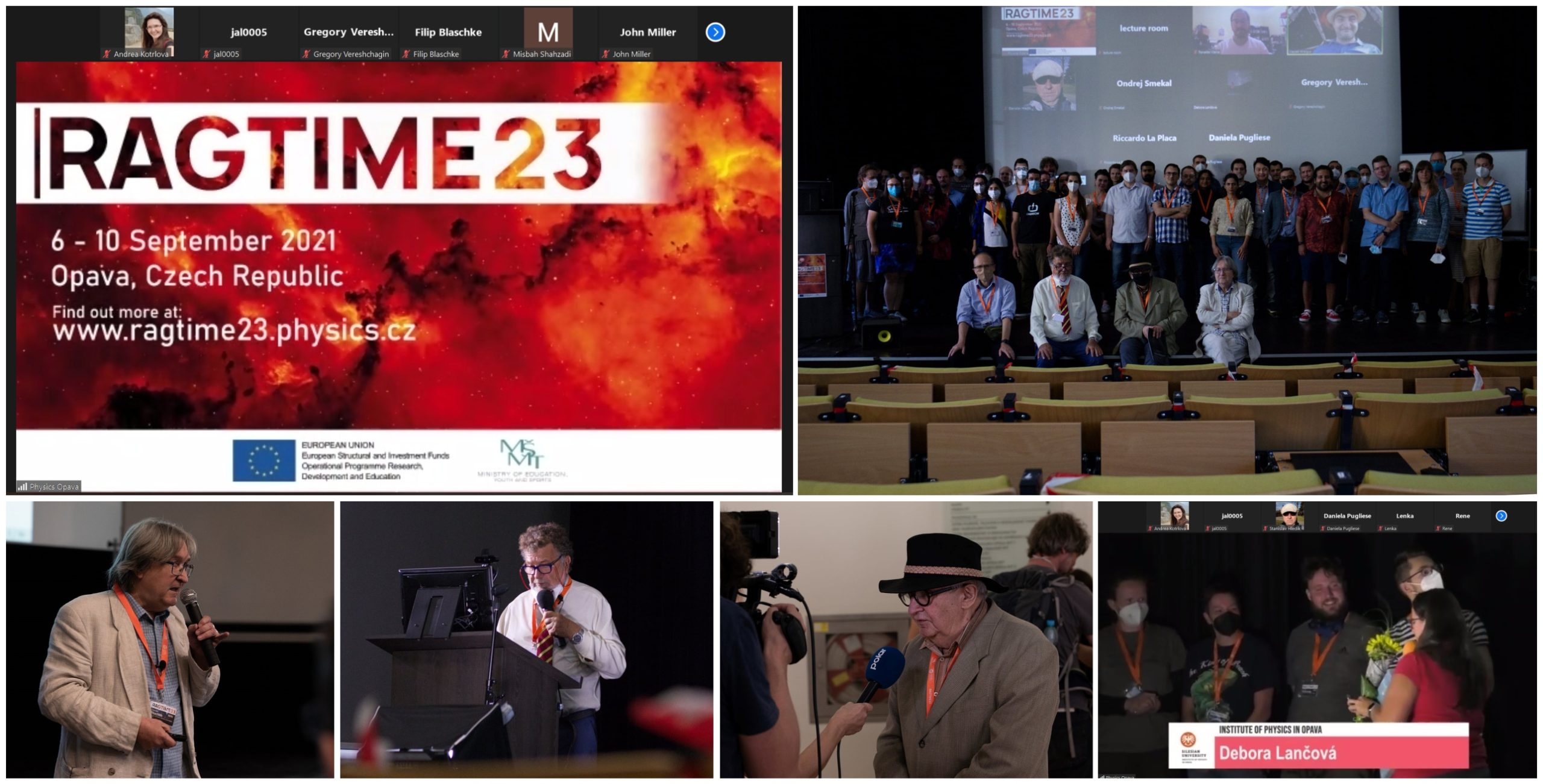
The RAGtime 23 workshop was held in a hybrid mode on September 6-10, 2021 and had 84 registered participants (17 online), 42 talks (6 keynote talks) and was attended by multiple experts and internationally renowned scientists, e.g., Remo Ruffini, Marek Abramowicz, John Miller, Luigi Stella and others. The workshop allowed for many valuable discussions and interactions between the participants.

The recordings from the RAGtime 23 workshop are available on YouTube channel of the Institute of Physics. Photo gallery from each day of the workshop is available on the Facebook profile of the Institute of Physics: Day 1, Day 2, Day 3, Day 4, Day 5.
Our Contributions
Talks
In August 2021, Andrea Kotrlová attended the TESS Science Conference II, organized online by the MIT Kavli Institute for Astrophysics and Space Research, Cambridge, Massachusetts, USA. TESS (Transiting Exoplanet Survey Satellite) is a NASA Astrophysics Explorer mission led and operated by the MIT Kavli Institute for Astrophysics and Space Research and managed by NASA’s Goddard Space Flight Center.

The TESS Science Conference II was timed at the beginning of the 2nd year of the TESS Extended Mission, and the 4th year overall. The conference covered all science done with TESS data, from Solar System (asteroids, trans-Neptunian objects, comets), through exoplanets and stellar astrophysics (asteroseismology, variable stars, stellar binaries), to extragalactic astronomy (supernovae, AGN, TDEs). The conference had nearly 700 virtual attendees, more than 50 speakers and more than 190 uploaded posters. The conference had a Slack workspace and Gather.town space for viewing posters and socializing. Two off-topic talks were also given during the conference: The Role of Art in Science Communication (the talk was timed with the expected release of a new batch of JPL Travel Posters) and The NASA Juno Mission (given by Steven Levin, Juno Project Scientist, JPL) on August 4th, 2021 – timed at one day before Juno’s 10 year launch anniversary.
Recordings of all sessions are available on the YouTube channel. All posters are freely available online through Zenodo and interactive posters are listed here.
In July 2021, Andrea Kotrlová participated at the 2021 Sagan Exoplanet Summer Virtual Workshop hosted by the NASA Exoplanet Science Institute (NExScI; located at Caltech/IPAC).
The Sagan Exoplanet Summer Workshops are held annually in late July and are aimed at advanced undergraduates, grad students and postdocs, however all are welcome to attend. The 2021 Sagan Summer Workshop (SSW) focused on young planets and the circumstellar disks from which they form during the first few million years of a star’s lifetime. The workshop featured 46 speakers covering a broad range of topics, including observations of young planets and disks with both ground-based and space-based techniques; the environmental influence of an active host star on its constituent disk and planets; and the theoretical bases for understanding the formation and evolution of the disks and young planets around stars.
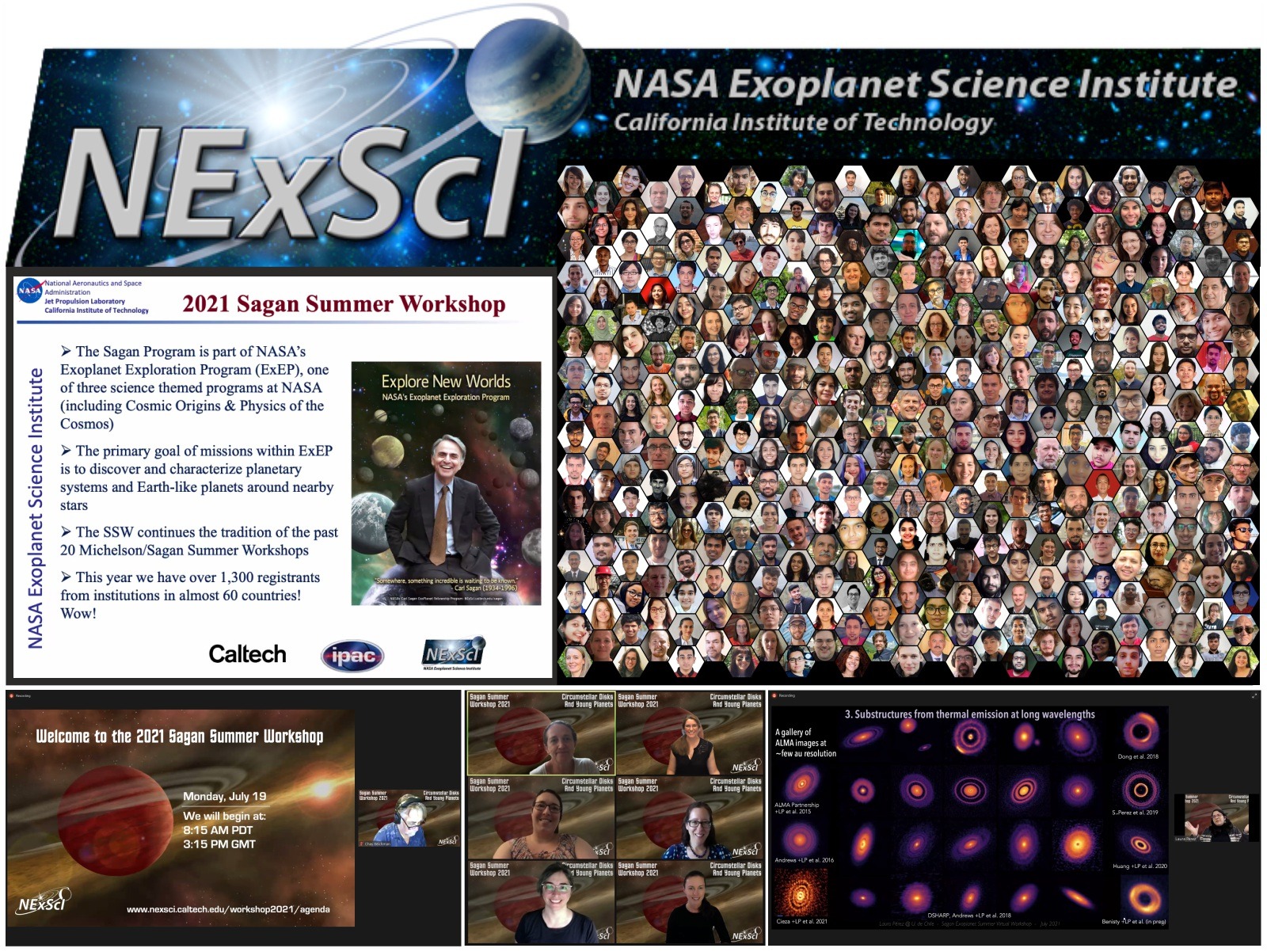
The workshop was held online via Zoom on July 19-23, 2021 and included lecture presentations, panel discussions, hands-on data modeling sessions using either Jupyter notebooks or Google’s Colaboratory (Colab) tool, a virtual poster session, and the opportunity to meet with the speakers in smaller Zoom meetings. The SSW Slack channel was set up for interactive discussions, and the Gather.town platform enabled people to meet informally and virtually. A record number of more than 800 participants from almost 60 countries participated in this fully online workshop.

The 2021 SSW web page has links to videos and hands-on session tutorials that can be accessed by anybody anytime. All of the talks were posted to a YouTube channel where participants and others can watch the presentations at any time.
The workshop X-ray Data Modelling of Accreting Black Holes was organized by the Institute of Physics in Opava and the Astronomical Institute of the Czech Academy of Sciences. The workshop was held in Hradec nad Moravicí from July 19th to 23th, 2021 and was intended for students interested in X-ray astronomy and X-ray data modelling. It had more than 40 participants.
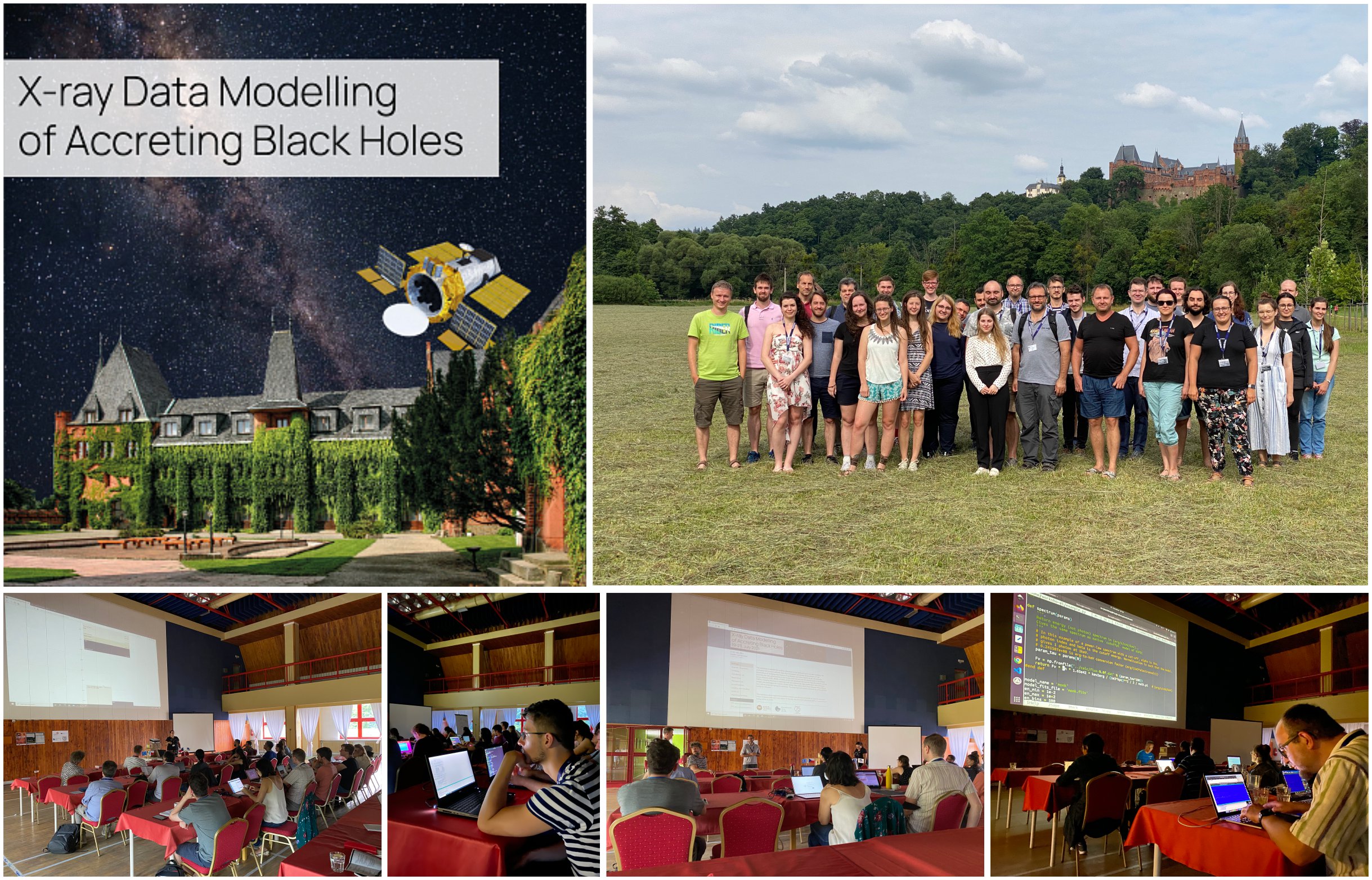
The workshop focused on selected state-of-the-art techniques and models for the analysis of X-ray observations of accreting black holes in X-ray Binaries and Active Galactic Nuclei. A brief overview of the main achievements of the current X-ray missions and the scientific goals of the planned future missions (IXPE, XRISM, ATHENA, eXTP) were given. The tools for X-ray data analysis, such as XSPEC, were presented, including also how to implement and use analytical and table models there. More advanced models and techniques (KY models, CLOUDY, STOKES, TITAN, MONK, HARM, Koral, Bayesian fitting method, etc.) were also presented during the workshop. The programme consisted of lectures as well as practical hands-on sessions.
Our Contributions
Talks
In May 2021, Andrea Kotrlová attended the XMM-Newton 2021 Science Workshop “A High-Energy View of Exoplanets and their Environments”, organized by the European Space Astronomy Centre (ESAC).
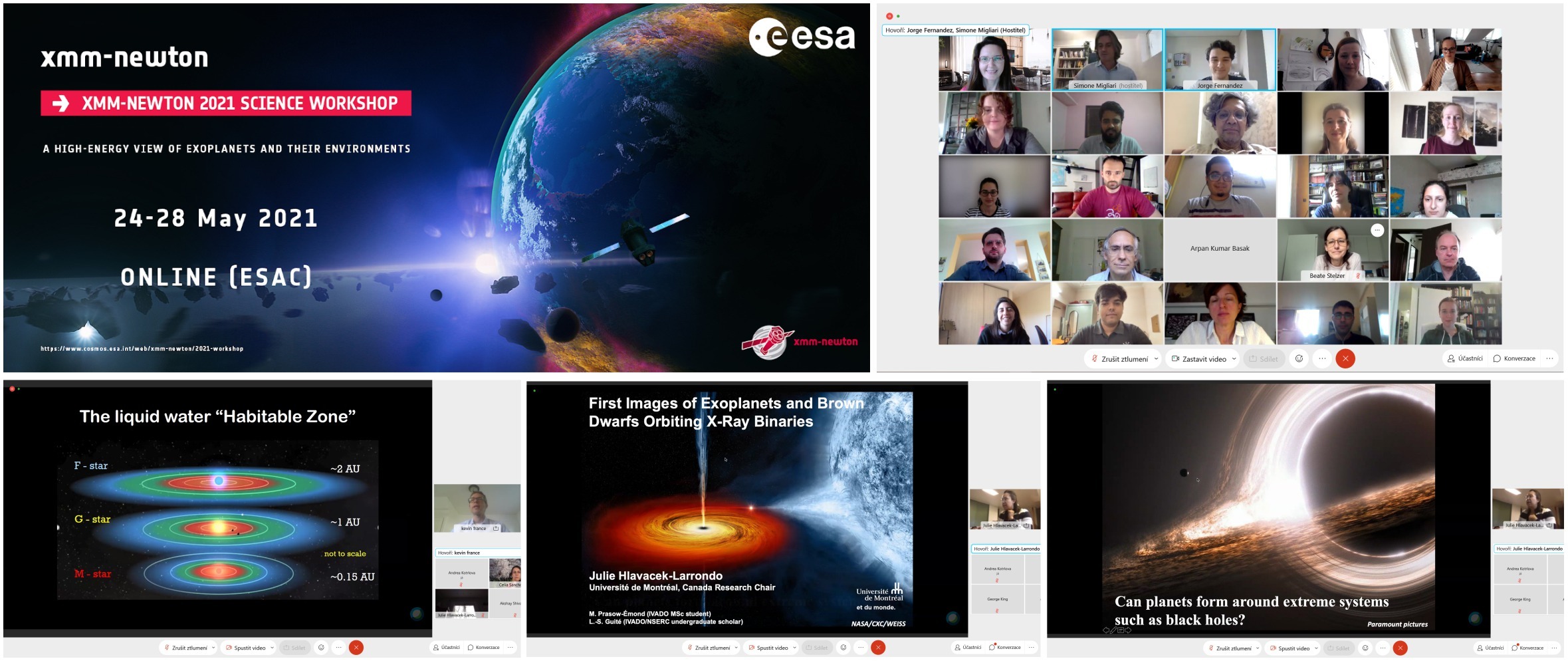
The workshop was held online via WebEx platform and brought together scientists working on exoplanets and their environments in relation to observables in the high-energy band with XMM-Newton and Chandra. Topics such as exoplanetary atmospheres, stellar high-energy irradiation, extreme environments of planets and stars, exoplanet formation, and interactions between stars and exoplanets were explored. The wealth of current and upcoming exoplanet discovery missions such as TESS, CHEOPS and PLATO, as well as the continuing bright future of high-energy observations with missions like eROSITA and Athena made this workshop a timely event.
In May 2021, Andrea Kotrlová successfully participated in the EANA International Spring School 2021 on Hydrothermal Vents, which took place virtually from May 17th to 21st, 2021. This Spring School was organized in the frame of the 20th anniversary celebrations of the European Astrobiology Network Association (EANA).
The first EANA online school focused on hydrothermal systems from interdisciplinary perspectives at the interfaces of geology, biology and chemistry. Hydrothermal systems are crucial environments for astrobiology – they are thought to be the theatre of life’s origins, host unprecedented polyextremophilic biodiversity, and are key targets in the search for life throughout the Solar System, especially on Mars and icy moons. The school was an ideal opportunity to discover or deepen the understanding of these unique environments.
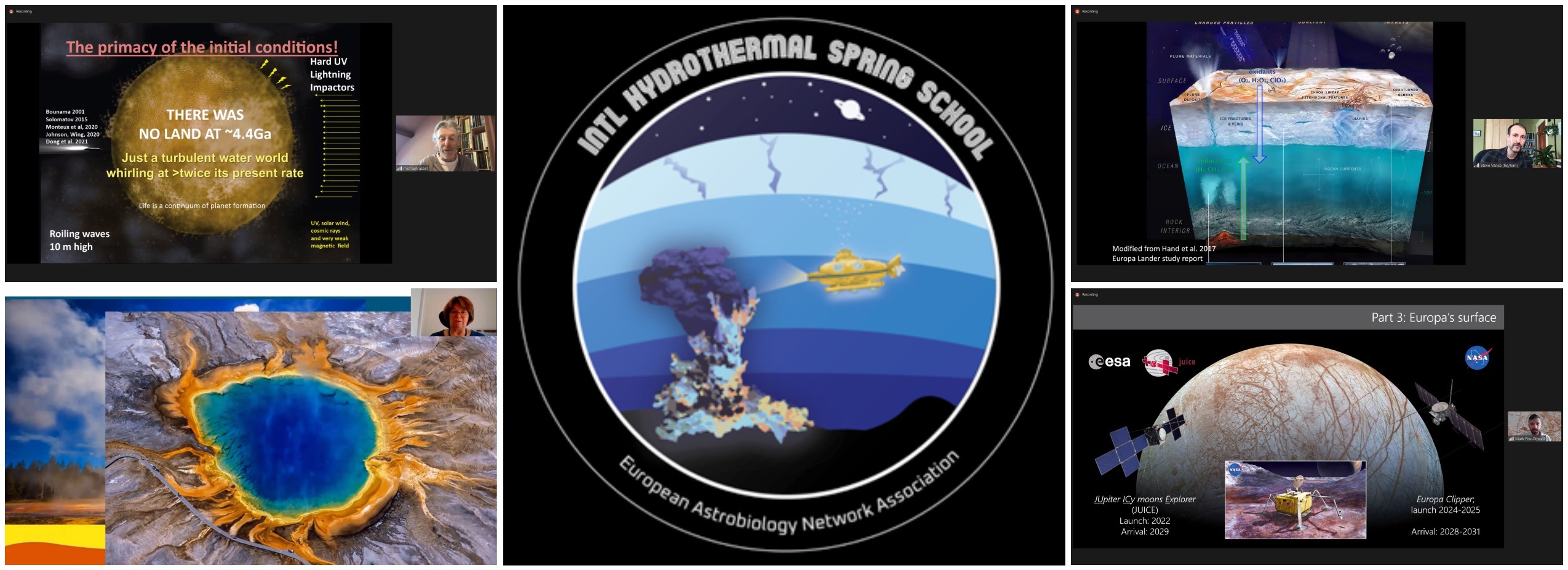
The school consisted of six lectures given by the leading scientists in this field (e.g., Frances Westall, Michael J. Russell or Franco Pirajno) who presented some of the most important and recent findings. Detailed information about the speakers along with the abstracts of their talks can be found in the EANA Spring School flyer. Recorded lectures are available here.
In April 2021, Andrea Kotrlová attended the online conference Climate Science from Space: Synergies for a greener innovation economy. The Conference was organised within the frame of the Portuguese Presidency of the Council of the European Union and the Ministry of Science, Technology and Higher education, with the support of the European Commission.
The conference addressed topics of major relevance to the Societal Challenge Climate Action. It aimed to help building bridges between space data collection technologies and services and climate ecosystems as a contribution to a greener and more resilient economic and social transition to climate change.
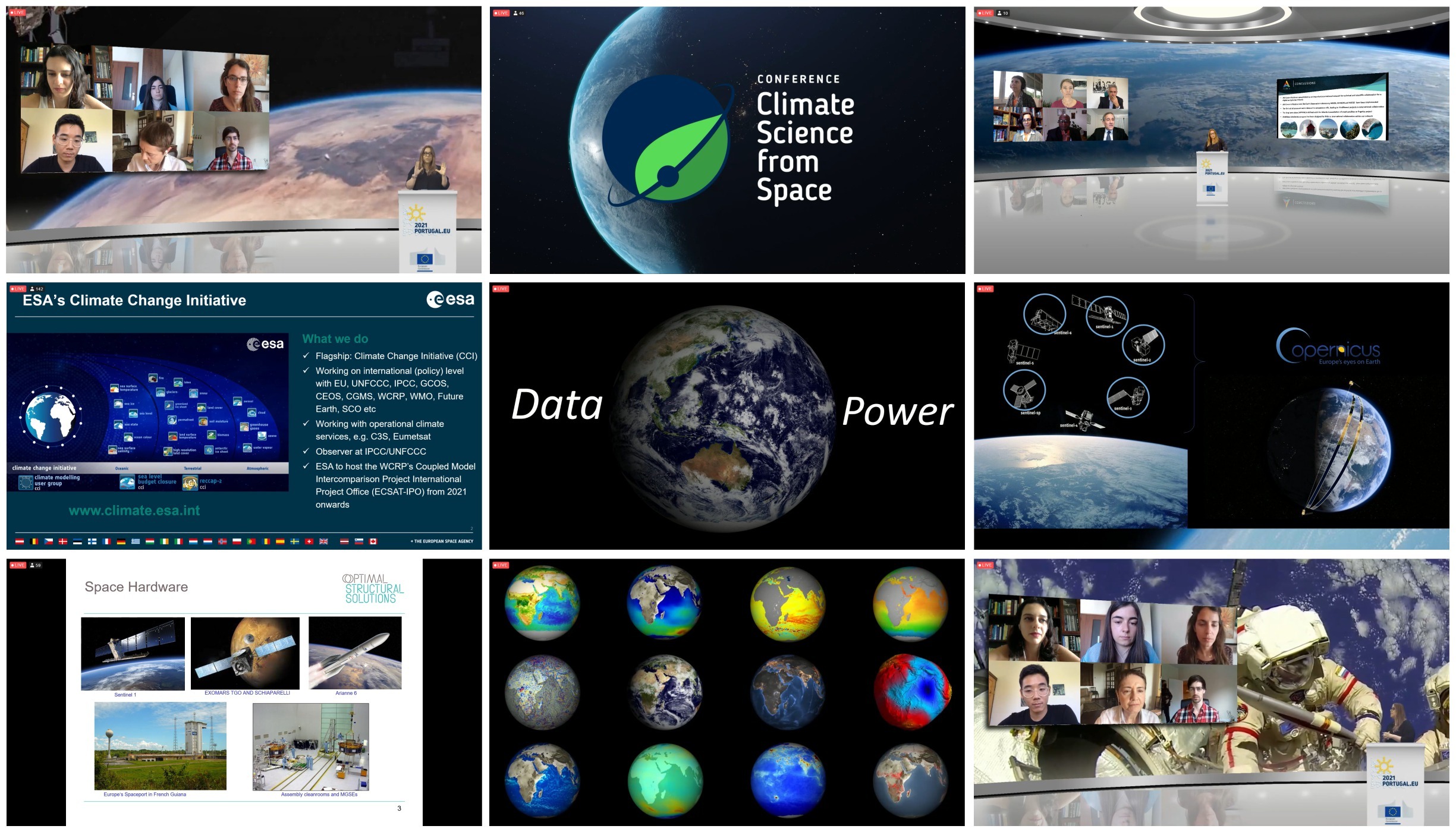
High-level speakers and experts shared their knowledge and insights about how space-based systems can improve daily lives and contribute to protecting our planet. In looking ahead towards the implementation of initiatives built on space-based applications with direct impact on the environment and the economy, concrete examples of developments and innovation in various sectors were discussed. An appropriate balance between environmental, economic and social elements was provided with Portuguese, European and international initiatives, projects and policies featuring innovation and technologies towards clean transformation.
The conference was live-streamed via internet and reached by more than 3 300 viewers during the sessions of April, 21st and 22nd. Presentations and recordings are available on the conference website and on this YouTube channel.
Gabriela Urbancová, Zuzana Turoňová and Martin Urbanec attended the 9th Ege University Observatory Workshop The Latest Shows from Neutron Stars that was held online on March 26 and April 2, 2021. The workshop was organized by Ege University and Istanbul University.
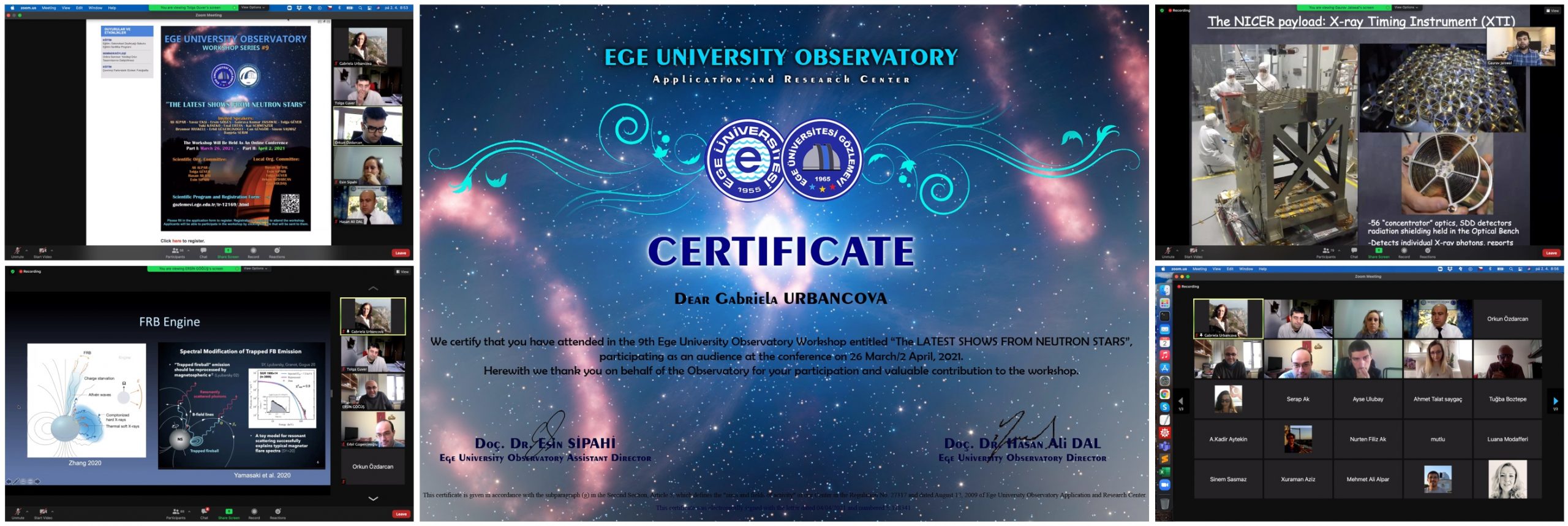
The main topics of the workshop included higlights from observations of X-ray binaries with Insight-HXMT and NICER, superfluidity in neutron stars, rotational phases of accreting neutron stars, magnetars as central engines and candidates for fast radio bursts, millisecond pulsars, gamma-ray bursts, neutron stars mergers and gravitational waves from isolated neutron stars.
THESEUS (Transient High-Energy Sky and Early Universe Surveyor) is a multi-instrument space mission concept currently under Phase A study by the European Space Agency as candidate M5 mission, in view of a launch opportunity in 2032. THESEUS mission would detect and characterize Gamma-Ray Bursts (GRB) up to cosmological distances, and monitor the transient X-ray Universe.
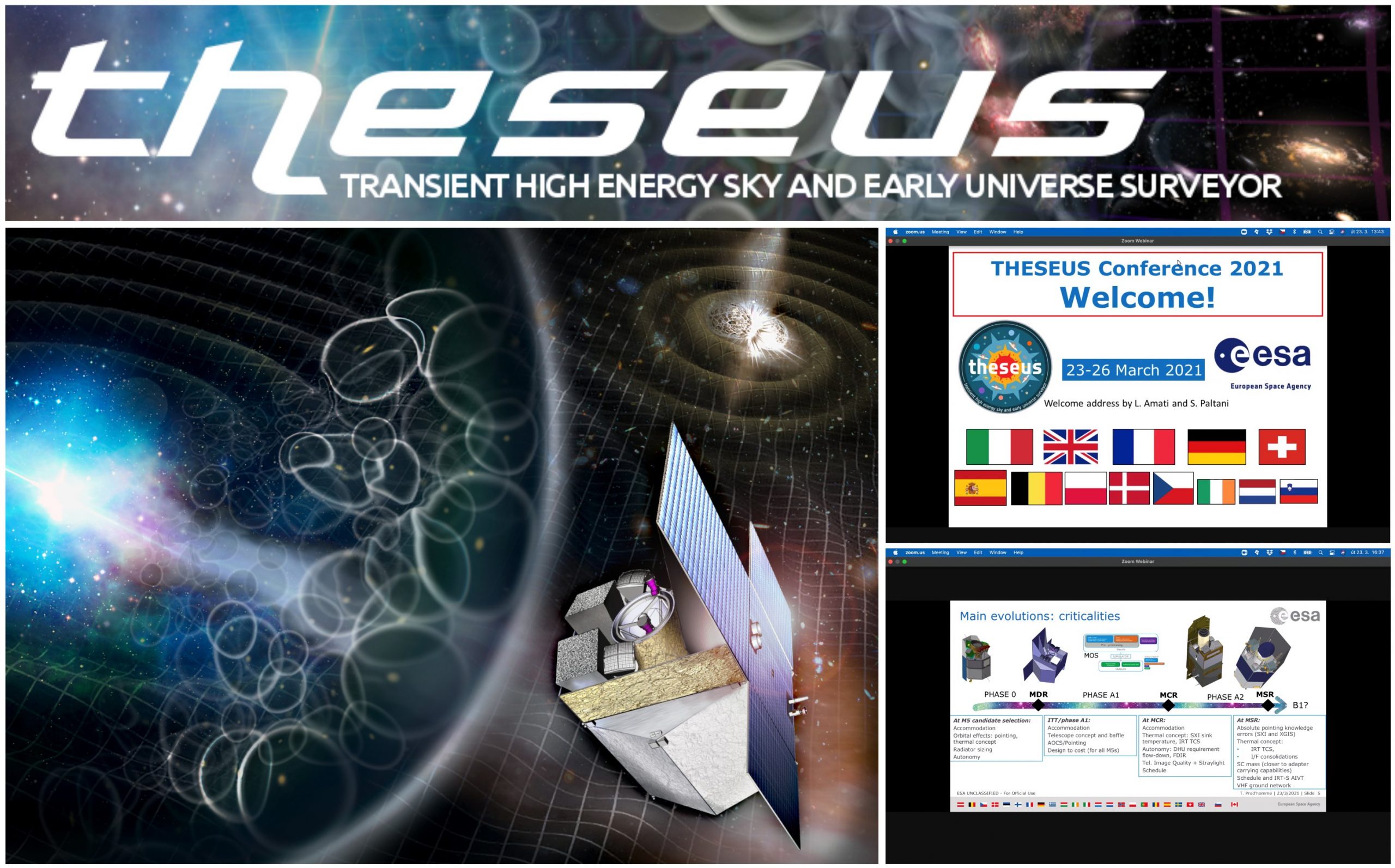
In March 2021, Gabriela Urbancová participated at the THESEUS 2021 online conference. Within this dedicated scientific event, the THESEUS science case was presented through dedicated review talks, discussing the status-of-the-art knowledge on GRB science, early Universe studies, gravitation wave physics, and transient Universe phenomena in general. The development status of the instruments on-board THESEUS were reported and discussed, together with the current assumptions for the mission profile. Contributed talks and poster session enriched the programme and suggested further exploitations of the THESEUS instrumentation in many other fields of the modern astronomy, astrophysics, cosmology, and fundamental physics. Posters and presentation slides can be found on the conference website.
In March 2021, Debora Lančová attended the Scientific Symposium RATOP 2021 – Relativistic astrophysics, theory and observational perspectives. The meeting was postponed from 2020, due to the pandemic situation, and was organized fully on-line. Nevertheless, the conference was a big success, and lot of participants enjoyed excellent talks on various topics of relativistic astrophysics, such as black hole accretion and relativistic jet formation, binary compact object coalescence, multi-messenger signals and counterparts to gravitational waves, event horizon of the black holes, particle acceleration via magnetic field reconnection in blazar jets, testing general relativity via compact objects observations, role of supermassive black holes in the galaxy evolution and many others.
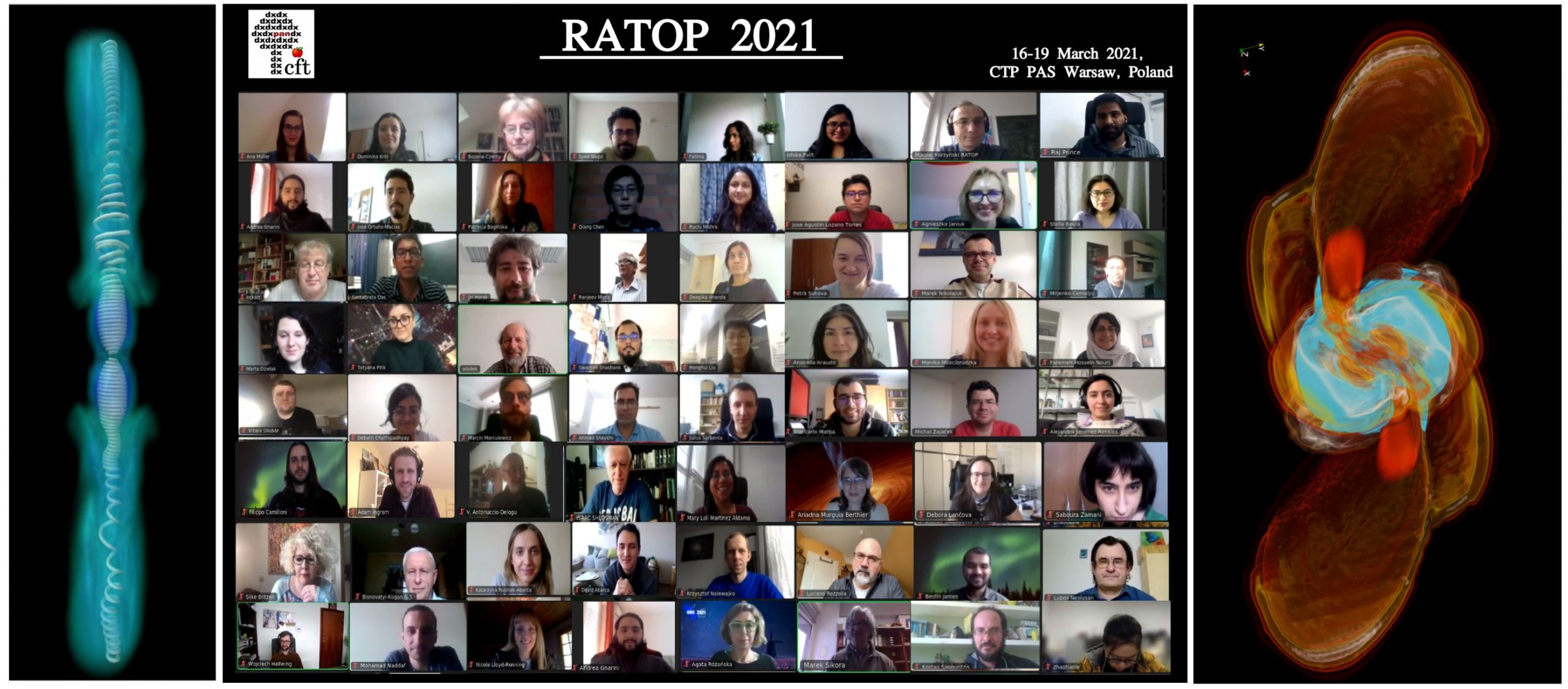
Most of the lectures have been recorded and are publicly available online here.
In February 2021, Martin Urbanec attended the online CompOSE 2021 – PHAROS WG1+WG2 Workshop: neutron star equations of state and transport properties.
On the observational side, several current missions (e.g., NICER, LIGO/Virgo) with new results and future missions (e.g., eXTP, ATHENA, SKA, ET) coming online in the near future have a specific focus on the neutron star equation of state (EoS). The focus of the CompOSE 2021 workshop was to discuss and set up a framework for an upgraded and extended online repository for EoS models and associated transport properties.

The repository will be based on the CompOSE catalogue and with an easily readable format, standardized over different communities, ready to use in simulations and interpretation of new data. The workshop aimed at defining specific tasks and potential teams to undertake them. Uploaded presentations are available under the name of the contributor on the conference website.
The Event Horizon Telescope (EHT) is an international collaboration capturing images of black holes using a virtual Earth-sized telescope. Release of the first black hole image on April 10, 2019 has highlighted new possibilities of using event horizon scale precision measurements to address fundamental questions in astronomy and physics. EHT results have already constrained exotic black hole alternatives, determined the mass and spin orientation of the M87 black hole, and revealed the black hole shadow predicted by general relativity, with more results expected with continued observations. Through the addition of new telescopes and higher observing frequencies, a next-generation EHT (ngEHT) can be engineered with substantially improved imaging capabilities to achieve a broad range of transformative science goals related to black hole accretion, jet physics, and strong-field regime of general relativity.
In February 2021, Zuzana Turoňová and Andrea Kotrlová attended the Science at the Horizon: The Next-Generation EHT Conference 2021. The conference was held online via Zoom and Slack and comprised of more than 90 presentations and discussion sections, with over 500 participants from over 30 countries.
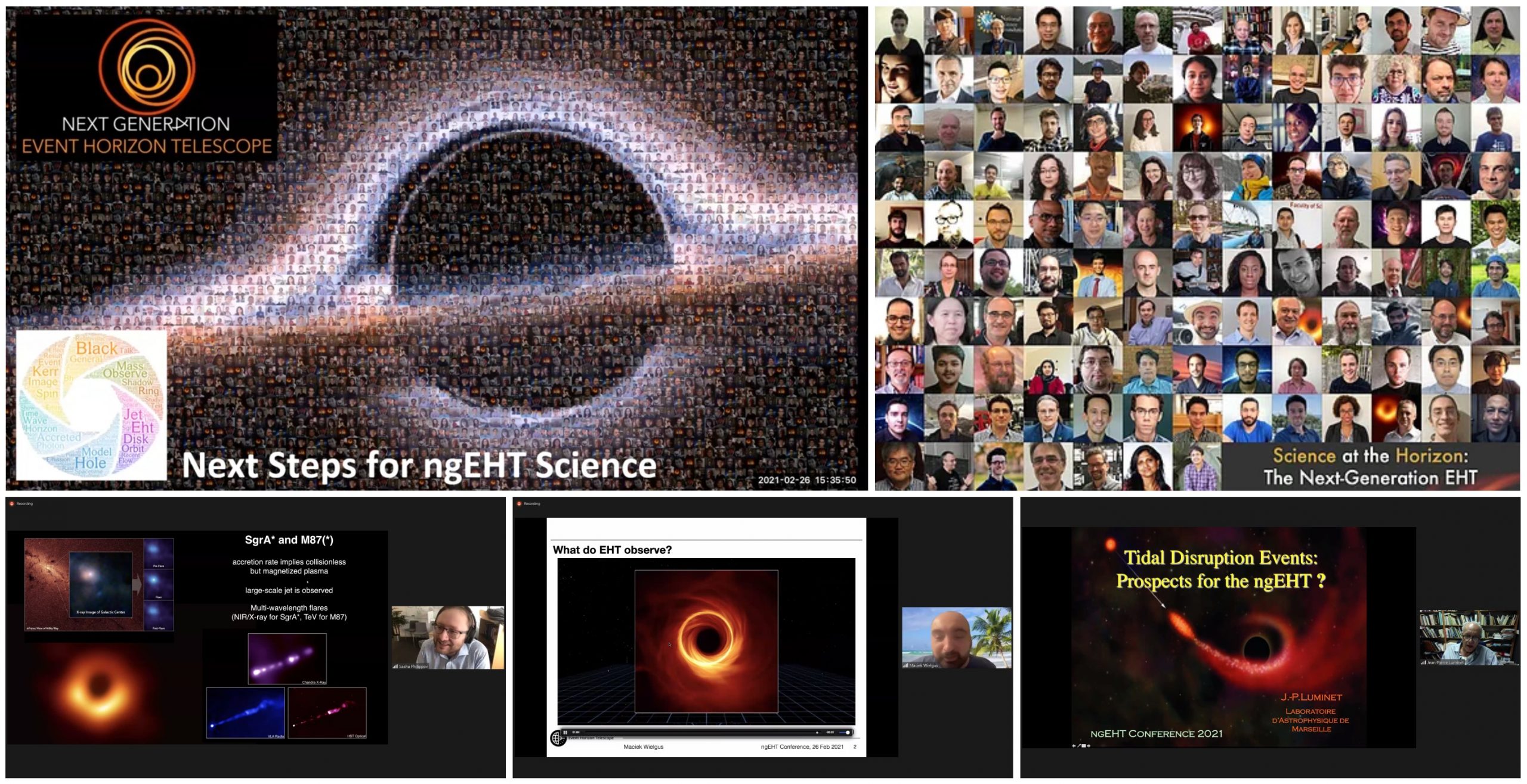
The ngEHT science meeting brought together experts in black hole astrophysics and Very Long Baseline Interferometry (VLBI) technology. The conference topics included astrophysics at the horizon: accretion and jet launching, exploring black hole populations with the next-generation EHT (ngEHT), multi-messenger science with the ngEHT, tests of the Kerr metric: resolving the photon ring, testing accretion modes and models for Sgr A* and M87, ngEHT architecture and optimization.
In January 2021, Andrea Kotrlová attended the school on (exo)planetary systems that was held as an online event at the Aula Virtual of the CSIC. The school was organised by Luisa M. Lara from the Instituto de Astrofísica de Andalucía, IAA-CSIC, Granada, in the frame of the IAA-CSIC Severo Ochoa project.

The school took place from the 18th of January to the 1st of February 2021. It aimed at providing a comprehensive understanding of the planetary systems in a broad context such that the current knowledge about exoplanetary systems and the solar system can be viewed in a common frame. The lectures covered topics related to protoplanetary discs, the host star, rocky planets, habitability, fluid and icy giants, minor bodies and debris discs, satellites and exoplanet atmospheres. Lectures have been given by internationally renowned scientists at the most prestigious research institutions from all over the world (e.g., Sara Seager or Kevin Heng). The attendees had the opportunity to interact with the lecturer for one hour after each lesson.

The video-lectures as well as the recorded Q&A live sessions are now fully open to the public and can be accessed here (after the registration in the Aula Virtual of the CSIC).